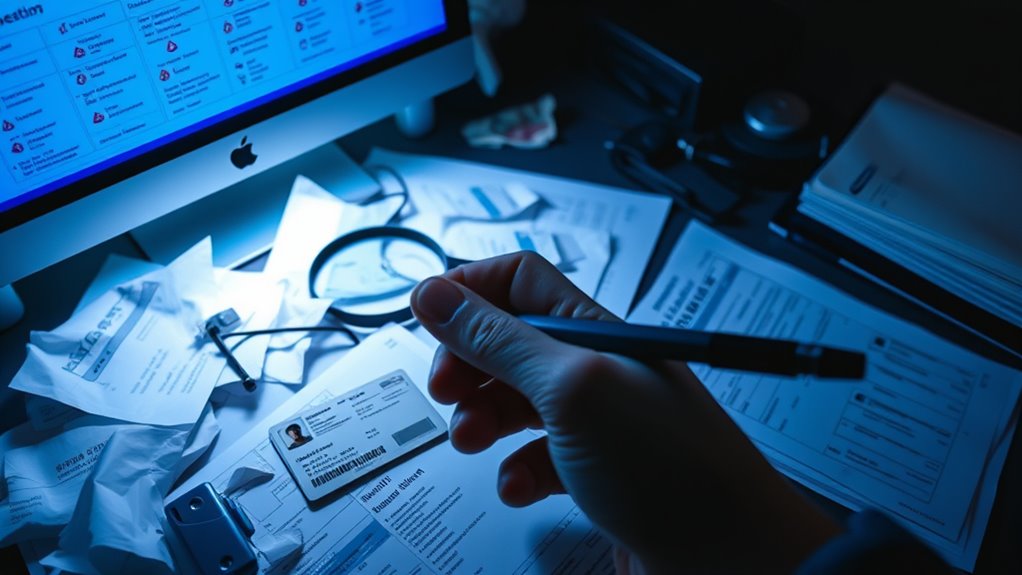Medical identity theft is on the rise, putting your personal health information at risk. Watch for suspicious billing, bills for treatments you didn’t get, or unfamiliar insurance claims. Check your medical records regularly for unauthorized activity. Protect sensitive data and act quickly if you notice any signs of fraud. Staying vigilant can help you avoid serious financial and health consequences. Keep an eye out—there’s more to uncover about spotting these warning signs effectively.
Key Takeaways
- Watch for unfamiliar healthcare charges or billing activity on your medical and insurance statements.
- Monitor your medical records regularly for unauthorized access or modifications.
- Be alert to prescriptions for drugs you haven’t ordered, especially controlled substances.
- Notice any sudden changes in your insurance claims or unexplained medical treatments.
- Respond promptly to suspicious activity or discrepancies to prevent further damage.

Have you ever considered how vulnerable your personal health information really is? In today’s digital world, your medical data isn’t just stored in your doctor’s office—it’s often scattered across multiple platforms, making it a prime target for hackers and identity thieves. Medical identity theft is on the rise, and criminals are becoming more sophisticated in how they exploit your information. One common tactic they use involves committing insurance fraud by filing false claims using your identity. This can lead to your health insurance premiums increasing or your coverage being denied when you actually need it. Another disturbing method is creating fake prescriptions, which can be sold on the black market or used to obtain medications illegally. These fraudulent activities not only compromise your financial and medical security but also pose serious health risks if unrecognized.
You might not realize there’s a problem until you notice unusual billing activity or receive bills for treatments you never received. For example, if you start seeing charges from healthcare providers or pharmacies that you don’t recognize, that’s a red flag. Fake prescriptions can be especially tricky because they often involve prescriptions for controlled substances or expensive medications that you never ordered. Criminals might use your identity to get these drugs, putting you at risk of legal trouble and health complications. Additionally, if your insurance claims suddenly spike with suspicious or inconsistent information, it’s a sign your medical identity could be compromised. Keeping an eye on your medical bills and insurance statements is essential—any discrepancies should prompt immediate investigation. Regularly reviewing your medical records can help detect unauthorized activity early and prevent further damage.
Your medical records contain sensitive data like your Social Security number, insurance details, and health history. When this information falls into the wrong hands, criminals can manipulate it to commit fraud or even steal your identity entirely. This can lead to a cascade of problems, from incorrect medical treatments being applied to you to long battles trying to clear your name. The sad truth is that once your medical identity is stolen, restoring your good name can take months or even years. Vigilance is key—regularly review your medical and insurance statements, and alert your providers if you notice anything suspicious. Protecting your health information means being proactive about your privacy and understanding how easily it can be exploited.
Understanding the warning signs of medical identity theft isn’t just about protecting your finances; it’s about safeguarding your health and peace of mind. Stay alert, monitor your medical records closely, and don’t hesitate to act if something seems off. Your health information is valuable—treat it with the care it deserves.
Frequently Asked Questions
How Can I Protect My Medical Records From Theft?
To safeguard your medical records, focus on health record security by regularly reviewing your bills and statements for any unusual activity. Use strong, unique passwords and enable two-factor authentication where possible. Trust data encryption techniques to protect your information online. Also, avoid sharing sensitive details on unsecured networks, and keep your devices updated. These steps help ensure your health information stays private and secure from theft.
What Should I Do if I Suspect Medical Identity Theft?
If you suspect medical identity theft, act quickly. Review your insurance claims thoroughly and contact your healthcare provider to verify recent treatments. Check your emergency contacts and medical records for any unfamiliar entries. Report suspicions immediately to your insurance company and the authorities. Keep detailed records of all communications, and consider placing a fraud alert on your credit report. Staying vigilant helps protect your health and financial security effectively.
Are There Specific Signs That Indicate My Health Info Has Been Compromised?
If you’re wondering whether your health info has been compromised, look for health record anomalies like unfamiliar appointments or treatments. Unexpected medical bills can also be a red flag, indicating someone else may have accessed your records. Keep an eye on your health statements and review your medical records regularly. Spotting these signs early helps you catch potential identity theft before it causes further damage.
How Does Medical Identity Theft Differ From Financial Identity Theft?
Imagine your health records turning into a chaotic crime scene—you’d notice medical billing errors, unfamiliar treatments, or sudden insurance fraud claims. Medical identity theft involves stolen health info used for false medical claims and billing, unlike financial theft which targets money. Your health info is misused for fraudulent medical services, making it more complex and harder to detect than just losing money through credit card fraud.
What Legal Actions Are Available if My Medical Identity Is Stolen?
If your medical identity is stolen, you have legal remedies available. You can file a police report and notify your healthcare provider and credit bureaus to stop further damage. Victim assistance programs can help you navigate the process and protect your rights. It’s essential to document everything, including suspicious bills or records, to support your case. Taking these steps helps you regain control and seek justice effectively.
Conclusion
Stay alert, because medical identity theft is like a shadow lurking in the dark corners of your health records. By spotting warning signs early, you can cut through the fog and protect your essential information from being stolen. Think of it as locking your personal treasure chest—your health data. Don’t let thieves turn your medical story into a tangled web. Stay vigilant, stay safe, and keep your health secure against these lurking predators.









